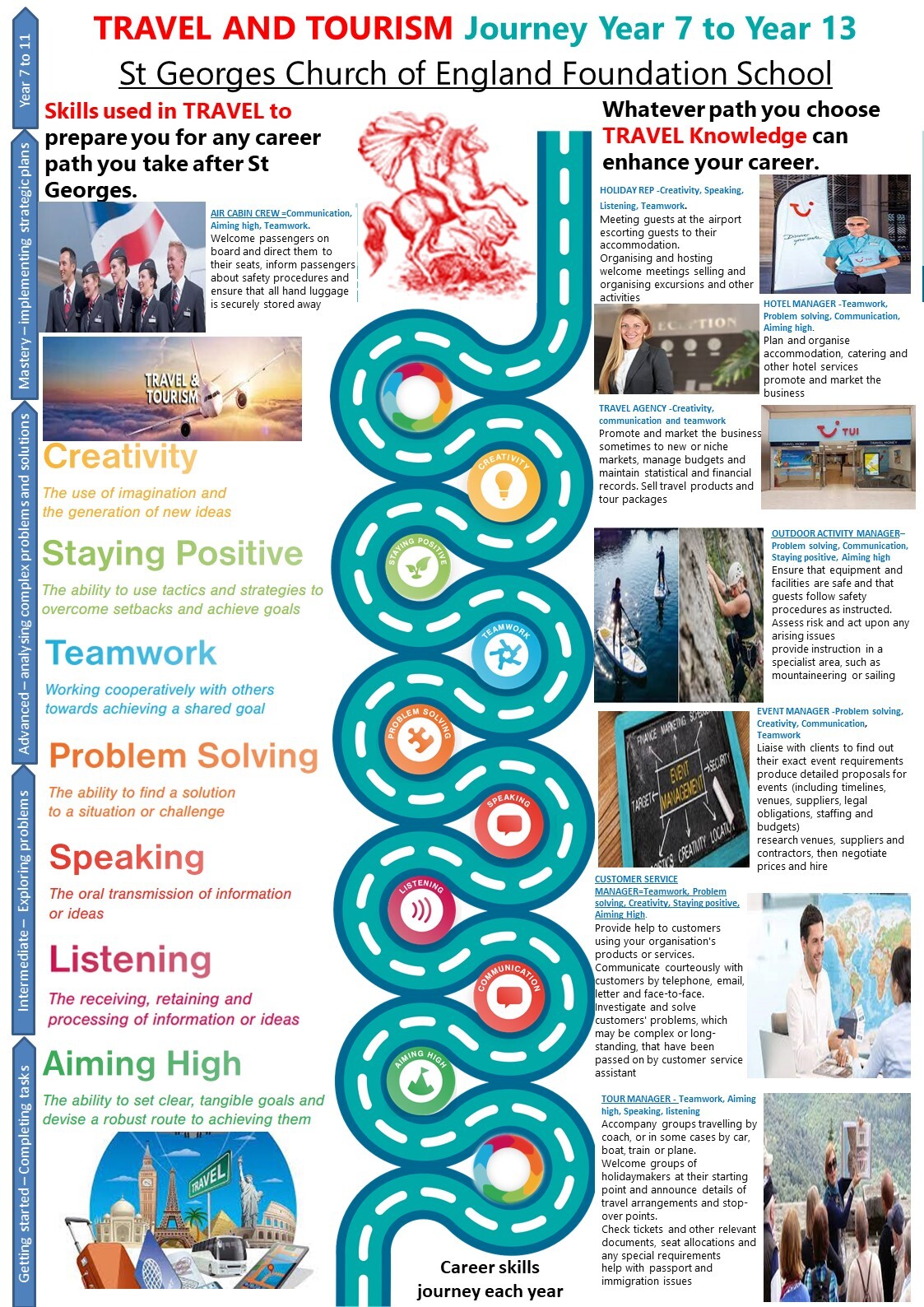Travel and Tourism (Level 2 and 3 BTEC)
Subject Vision
Adventurous – Within the Travel curriculum we encourage student to take risks or to try out new methods, ideas, or experiences to gain knowledge, skills and understanding through School trips and lesson activities. We aim to create a learning environment that allows students to step outside their comfort zone, to explore new cultures, destinations and to understand how tourism works within these countries.
Challenging – Classroom activities are designed and created to enable students to become independent learners, through independent research tasks. Challenge within Travel and Tourism involves testing student’s ability; through questioning, independent reading and extension tasks that stretch and push student to complete tasks independently through the use of formal written assessment. Preparing for coursework and exams provide a platform that allows students to be challenged and thrive.
Resilience – It is important to us to deliver a curriculum that enable students to work under pressure, meet deadlines and be able to reflect and complete coursework to improve grades and equip students with the ability to solve problems and build confidence in their own abilities.
Curiosity – The Travel curriculum provides the opportunity for students to open their minds and research different parts of the world, understanding factors that affect tourism from political to economic and environmental factors. Case studies are used to enhance students’ knowledge enabling them the ability to understand the diverse range of Travel options.
Independence - Students have the opportunity to develop and think independently, through research activities applying theory and knowledge to Set assignment briefs. The course provides students with the ability to build and question why rather than just excepting tasks and events.
Community – Within the Travel lessons, students are able to work together in groups in order to develop their critical thinking skills and build better communication skills.
Staff
Homework
| Year | Day Homework is set |
|---|---|
| Year 10 | Monday |
| Year 11 | TBC |
Year 12 and 13 Travel students will be set coursework tasks by each teacher each week.
Our Learning Journey

Level 2 Subject Information - KS4
BTEC Level 1/2 Tech Award (2022)
Travel and tourism is one of the UK’s largest sectors, currently employing over 2.5 million people. This qualification aims to inspire and enthuse learners to consider a career in the travel and tourism sector. It gives learners the opportunity to gain a broad knowledge and understanding of, and develop skills in the travel and tourism sector.
Students studying Level 2 Travel will receive three timetabled lessons a week, in Year 10 and 11. Over the course of the two years students will study 3 components.
| Term 1 | Term 2 | Term 3 | Term 4 | Term 5 | Term 6 | |
|---|---|---|---|---|---|---|
| Year 9 | Component 1 Learning Aim A and B | |||||
| Year 10 |
Component 1 Learning Aim A and B Non - Examinted Assessment PSA |
Component 1 Non - Examinted Assessment PSA |
Component 2 Learning Aim A and B Non - Examinted Assessment PSA |
Component 2 Non - Examinted Assessment PSA |
Component 2 Non - Examinted Assessment PSA
Component 3 - Exam Prep |
Component 3 - Exam Prep |
| Year 11 | Component 3 - Exam Prep | Component 3 - Exam Prep | Component 3 - Exam | Resit | Resit |
Revision - BTEC Level 2 Tech Award (KS4)
General Information (Useful Information for Parents)
Students studying level 2 Travel will receive three timetabled lessons a week, in Year 10 and 11.
Component 1 and 2 are completed in Year 10
Component 3 in Year 11
In Year 11 pupils will spend the first two terms revising for their January exam on the UK Travel and Tourism Sector. Students will have the opportunity to re sit this exam in the summer of Year 11.
| Personal Learning Checklist | |
|---|---|
| Example Exam Questions/Model Answers | |
| Revision Material/Sharepoint | (Pupils must log in with their username as their usual computer login followed by @st-georgescofe-thanet.kent.sch.uk (e.g. JSmith123@st-georgescofe-thanet.kent.sch.uk) and their usual password they use to log on to school laptops) |
Revision - BTEC Level 3 National (KS5)
GENERAL INFORMATION (USEFUL INFORMATION FOR PARENTS)
- Paper examination
- Graded from U through to Distinction
Exam Information
In the January of Year 12, students sit a written exam. This is 1 hour 30 minutes and is out of 75marks. Students will be assessed on the World of Travel and Tourism.
In the January of Year 13, students sit a 3-hour exam which is worth 60 marks.
| Personal Learning Checklist |
Unit 1 = Click Here Unit 2 = To follow |
|---|---|
| Example Exam Questions/Model Answers |
Unit 1 = Mark Scheme for June 2022 Exam Paper Unit 2 = |
| Revision Materials/Sharepoint |
Unit 1 = Unit 2 = to follow
RESOURCES The following textbook is available for students to buy BTEC NATIONALS TRAVEL & TOURISM STUDENT BOOK + ACTIVEBOOK Publisher: Pearson Author: Gillian Dale ISBN: 9781292187754
|
JOB OPPORTUNITIES
Careers in Travel and Tourism
What does an air cabin crew do?
As a member of air cabin crew, you are responsible for the comfort and safety of passengers on an aeroplane. You’ll meet and greet passengers, provide the safety briefing, and serve food and drinks. You will need excellent communication skills and a good level of English and numeracy skills. Travel is an essential part of the role.
What do I need to do to become an air cabin crew?
Entry requirements for air cabin crew vary between airlines. Airlines usually require air cabin crew to be between five feet two inches and six feet two inches tall, with weight restrictions varying.
You will need to be able to swim well and have a good level of physical fitness. You will need to be over the age of 18 to become a member of air cabin crew. The ability to speak a second language is highly desirable.
Airlines will usually require a good standard of education, including GCSEs (grades A-C) in maths and English, or equivalent qualifications. Previous experience in a customer service role will also be useful.
Vocational courses involving an element of customer service, e.g. travel and tourism, or hospitality and catering, could provide some useful background knowledge. Similarly, apprenticeships in these areas could provide helpful skills.
Essential qualifications
- Ability to swim
- Meet height and weight restrictions for the airline (these vary so make sure you check before you apply)
- Over 18 when you apply
Airline Pilot
What does an airline pilot do?
Airline pilots fly goods and people to destinations across the world. You could be working for a big airline or smaller airline. The size and type of aeroplanes you fly will vary depending on which route you are travelling and how many people, or how much cargo you are transporting. You’ll need good leadership skills as well as being able to work effectively in a team. You’ll also need to be good at problem solving. You may be flying shorter internal (within a country) routes, or you may be piloting longer international journeys – either way, travel is an essential part of the job.
What do I need to do to become an airline pilot?
You will usually need to have flown a number of hours as a first officer. To become a first officer, you must first complete your Airline Transport Pilots Licence (ATPL). There are three main routes to obtaining the ATPL – through private training, through armed forces training, or through a university course which includes pilot training. To obtain a full ATPL you must be over 21 years old. To work as a first officer or airline pilot, you will need to also pass a rigorous medical test.
Essential qualifications
- ATPL
- Over 21 years old
- Pass medical test
Tour Manager
Tour managers manage the travel arrangements of holidaymakers and business clients.
What does a tour manager do?
Tour managers, or tour directors, are responsible for making sure that travel arrangements for groups of holidaymakers run as smoothly and enjoyably as possible. Tour managers accompany passengers throughout a tour, keeping them informed about details such as arrival and departure times and places of interest.
The role would usually involve working on coach tours that could last from two or three days to over a month. It might also involve working on tours by rail or cruise ship.
This job would involve:
- welcoming the tour group at the start of their trip and informing them of travel arrangements and stopover points
- making sure all travel arrangements run according to plan, and that the accommodation, meals and service are satisfactory
- helping with passport and immigration issues
- giving spoken commentaries about places en route (local guides may also be used)
- promoting and selling excursions to tour members
- advising on sights, local restaurants and shops at each destination
- recording issues that may require follow-up after the tour
Tour managers would need to be available at almost any time to give advice, solve problems and deal with emergencies, such as loss of passports or money, illness or difficulties with accommodation.
They might also specialise in the business-travel sector. This would involve managing the travel arrangements for people on business, which could include dealing with insurance, visas, vehicle hire and responding to itinerary changes.
What do I need to do to become a tour manager?
You do not usually need any particular qualifications to become a tour manager, but you would need a good standard of general education.
You would also need:
- experience of working with people
- a friendly and approachable manner
- a keen interest in the culture, geography and history of the locations covered by the tour
- a good working knowledge of foreign languages if touring overseas
- experience of working overseas if the job you are applying for is based abroad
You could move into this job after gaining experience in a related role, such as a travel agent, tour guide or tour rep.
Qualifications related to leisure, travel and tourism are available at all levels through colleges and universities and you may find it useful to complete one of these, but it is not essential.



